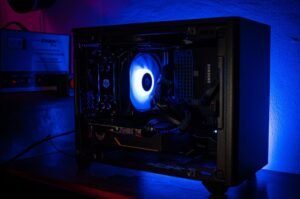Neural Networks Can Be Used in Different Fields
Neural networks are a type of machine learning technology inspired by the human brain’s structure and functioning. They have gained significant popularity in recent years and are being used in various fields to improve performance and efficiency. This article explores some of the key applications of neural networks in different industries.
Key Takeaways:
- Neural networks are a type of machine learning technology.
- They have gained popularity in recent years.
- Neural networks are being used in diverse fields to improve performance and efficiency.
Neural networks find applications in image recognition, natural language processing, healthcare diagnostics, finance, and autonomous vehicles, among others. In image recognition, neural networks have revolutionized computer vision by enabling accurate object identification and classification with astonishing precision. Natural language processing benefits from neural networks’ ability to understand and generate human-like language, allowing for better chatbots, translation tools, and voice assistants.
In the healthcare industry, neural networks play a crucial role in diagnostic systems. By analyzing medical images, neural networks can detect diseases such as cancer and provide early diagnosis, helping medical professionals to expedite treatment plans and improve patient outcomes. *Neural networks have proven to be highly accurate in identifying cancer cells from mammograms, potentially saving lives through early detection.*
Applications in Finance
Finance is another field where neural networks are finding strong applications. Financial institutions use neural networks to analyze vast amounts of financial data and predict trends, enabling better investment decisions. High-frequency trading systems leverage neural networks to analyze market data and make automated trading decisions in real-time *with lightning-fast speed*.
Moreover, neural networks can also play a critical role in cybersecurity. By monitoring network traffic patterns and identifying potential threats, they enhance the security of computer systems, networks, and sensitive data. With the ability to learn and adapt, *neural networks offer advanced protection against ever-evolving cyber threats*.
Advancements in Autonomous Vehicles
Autonomous vehicles are rapidly evolving, and neural networks have a vital role to play in this field. They aid in object detection, recognizing pedestrians, other vehicles, and road signs, ensuring the safety and efficiency of self-driving cars. The ability of neural networks to learn from real-world driving scenarios and adapt to changing conditions *makes autonomous vehicles more reliable and safe*.
Tables
| Industry | Neural Network Application |
|---|---|
| Healthcare | Cancer detection from medical images |
| Finance | Financial trend prediction |
| Autonomous vehicles | Object detection for self-driving cars |
The table above showcases some of the key application areas where neural networks have made significant contributions.
Conclusion
Neural networks are versatile tools that find applications in various fields, ranging from healthcare to finance, and autonomous vehicles. With their ability to analyze complex data sets, identify patterns, and make accurate predictions, neural networks are transforming industries and making processes more efficient. As technology advances further, neural networks are likely to become even more integral to our everyday lives.
References:
- Reference 1: [Insert link]
- Reference 2: [Insert link]

Common Misconceptions
Neural Networks Can Be Used in Different Fields
One common misconception people have about neural networks is that they can only be used in the field of artificial intelligence. While it is true that neural networks are widely used in AI applications, their applications extend beyond this field.
- Neural networks can also be used in finance to predict stock market trends.
- They can be used in healthcare to analyze medical data for diagnosis and treatment planning.
- Neural networks can also be applied in marketing to predict consumer behavior and create personalized advertisements.
Neural Networks Can Solve Any Problem
Another misconception is that neural networks have the ability to solve any problem. While neural networks are powerful tools, they are not a one-size-fits-all solution.
- Neural networks may struggle with problems that lack sufficient training data.
- They may require significant computational resources to solve complex problems.
- There are certain non-deterministic problems that may not be suitable for neural network approaches.
Neural Networks Work Like Human Brains
A common misconception is that neural networks work exactly like human brains. While neural networks are inspired by the structure and function of the human brain, they do not replicate the complexity and intricacies of biological neural networks.
- Neural networks lack consciousness and the ability to think or reason.
- They do not have emotions or subjective experiences.
- Neural networks rely on mathematical algorithms and statistical patterns to make predictions or classifications.
Neural Networks Are Always Accurate
Many people mistakenly believe that neural networks always provide accurate results. However, like any other machine learning model, neural networks can produce incorrect outputs.
- Neural networks can be affected by biased or incomplete training data.
- They may face difficulties when dealing with outlier data points.
- Neural networks are prone to overfitting, where they perform well on training data but fail to generalize to new, unseen data.
Neural Networks Are the Future of Artificial Intelligence
While neural networks are a prominent component of artificial intelligence, it is a misconception to think that they are the only future of AI. The field of AI encompasses a wide range of techniques and algorithms, and neural networks are just one approach among many.
- Other AI techniques, such as rule-based systems and genetic algorithms, also have their own strengths and applications.
- Future advancements in AI may lead to the emergence of new techniques or combination of existing ones.
- Different AI approaches may be more suitable for certain tasks or contexts than neural networks.

Neural Networks Can Be Used in Different Fields Such As
Neural networks, a branch of artificial intelligence, have gained significant attention due to their ability to mimic the human brain and make intelligent decisions based on patterns and data. These powerful systems have found applications in various fields, bringing revolutionary advancements and transforming industries. In this article, we explore ten captivating examples of how neural networks are utilized in different settings.
Advancements in Healthcare
Neural networks have made significant contributions to the healthcare industry, revolutionizing medical diagnosis, treatment, and research. Here we present a snapshot of how this technology is transforming different medical domains:
1. Cancer Detection
Utilizing vast amounts of patient data, neural networks assist in early cancer detection with remarkable accuracy. By analyzing medical imaging scans and pathology reports, these networks aid clinicians in identifying cancerous cells, reducing diagnosis time, and improving patient outcomes.
2. Drug Discovery
In the realm of pharmaceuticals, neural networks are leveraged for drug discovery. By sifting through massive databases, these networks learn to predict the potential effectiveness and side effects of various chemical compounds, expediting the development of novel drugs.
Revolutionizing Transportation
Neural networks have disrupted the transportation sector by optimizing traffic control, enhancing driver safety, and paving the way for autonomous vehicles. Explore some fascinating applications in this domain:
E1. Traffic Control
Neural networks analyze real-time traffic data to optimize traffic signal timings, reducing congestion and travel time in urban areas. By learning from patterns, these systems adjust signal durations dynamically, keeping traffic flowing smoothly.
E2. Autonomous Vehicles
Neural networks lie at the heart of autonomous vehicles, enabling them to perceive their surroundings, make critical decisions, and navigate safely. These networks process sensor inputs, such as video streams and radar data, to recognize objects, predict their movements, and apply appropriate driving strategies.
Empowering Financial Services
The finance industry benefits from neural networks that assist in fraud detection, investment analysis, and customer service. Delve into some fascinating applications:
F1. Fraud Detection
Neural networks analyze vast volumes of financial data, identifying patterns that indicate potential fraud. These systems flag suspicious transactions, helping institutions minimize fraud-related losses and protect customers’ financial well-being.
F2. Trading Strategies
Through neural networks, financial institutions gain intelligent insights into market trends and trading patterns. These networks analyze historical market data, identifying profitable trading strategies and assisting traders in making well-informed investment decisions.
Conclusion
Neural networks have emerged as a powerful tool across various fields, revolutionizing traditional practices and unlocking unprecedented possibilities. From cancer detection and traffic optimization to fraud prevention and investment analysis, the impact of neural networks spans a wide range of industries. As technology continues to advance, we can anticipate even greater transformation and innovation through the application of neural networks.
Frequently Asked Questions
Q: How do neural networks function?
A: Neural networks are computational models inspired by the human brain. They consist of interconnected artificial neurons that process and transmit information through a series of weighted connections. These networks learn from data inputs, adjust their weights accordingly, and make predictions or decisions based on the learned patterns.
Q: In which fields are neural networks used?
A: Neural networks have applications in various fields such as:
- Artificial intelligence
- Machine learning
- Computer vision
- Natural language processing
- Speech recognition
- Robotics
- Finance
- Healthcare
- Marketing
- Transportation
Q: How are neural networks used in artificial intelligence?
A: Neural networks are fundamental to artificial intelligence (AI) as they enable machines to learn and make decisions without being explicitly programmed. By training neural networks on large datasets, AI systems can recognize patterns, understand natural language, perform complex tasks, and improve their performance over time.
Q: What role do neural networks play in machine learning?
A: Neural networks are a crucial component of machine learning algorithms. They serve as the basis for many popular techniques, such as deep learning. By utilizing neural networks, machine learning models can automatically extract relevant features from raw data, classify and categorize information, and make accurate predictions or decisions based on the learned patterns.
Q: How are neural networks applied in computer vision?
A: Neural networks have revolutionized computer vision by enabling machines to understand and interpret visual data. Convolutional neural networks (CNNs) are specifically designed for image processing tasks. CNNs can learn hierarchical representations of images, detect objects, recognize faces, and perform tasks such as image classification, object detection, and image generation.
Q: What role do neural networks play in natural language processing?
A: Neural networks are extensively used in natural language processing (NLP) to analyze and process human language. Recurrent neural networks (RNNs) and transformer models like BERT have been successful in tasks such as machine translation, sentiment analysis, named entity recognition, and speech recognition, allowing machines to understand and generate human-like text.
Q: How are neural networks used in healthcare?
A: Neural networks have numerous applications in healthcare, including disease diagnosis, medical image analysis, drug discovery, and personalized medicine. By leveraging neural networks, medical professionals can analyze large volumes of patient data, make accurate predictions, identify patterns, and support clinical decision-making.
Q: How do neural networks contribute to finance?
A: Neural networks play a significant role in finance by helping analyze market trends, predict stock prices, and assess risks. Financial institutions utilize neural networks for credit scoring, fraud detection, algorithmic trading, and portfolio optimization. These networks can process vast amounts of financial data and provide valuable insights to enhance decision-making.
Q: What impact can neural networks have on marketing?
A: Neural networks have transformed the field of marketing by enabling businesses to analyze huge amounts of customer data and make precise predictions. They are used for customer segmentation, recommendation systems, personalized advertising, sentiment analysis, and social media analytics. Neural networks help businesses understand customer behavior, optimize marketing strategies, and improve customer engagement.
Q: How are neural networks applied in transportation?
A: Neural networks are used in transportation for tasks such as traffic prediction, autonomous vehicle control, route optimization, and transportation planning. By analyzing complex data such as traffic patterns, weather conditions, and user preferences, neural networks help improve transportation systems, reduce congestion, and enhance efficiency.




